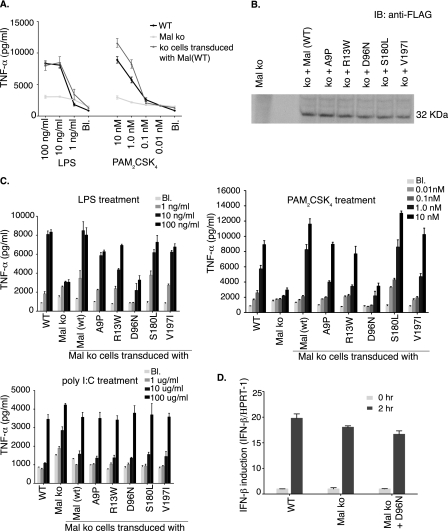FIGURE 2.
D96N has impaired cytokine production in response to TLR2 or TLR4 ligands. A, functional restoration of Mal-deficient immortalized macrophage cell line. Immortalized Mal knock-out (ko) cells were transduced with a retrovirus carrying FLAG-tagged Mal. Single cell clones were selected and tested for their responsiveness to LPS and PAM2CSK4. B, the same strategy was used to generate cell lines expressing the different variants of Mal. For each cell line clones were chosen for further study based on similar levels of expression of Mal or the Mal variant. IB, immunoblot. C, immortalized Mal-deficient macrophage cell lines expressing either WT Mal or one of the variants were stimulated with LPS, PAM2CSK4, and poly I:C overnight. The supernatants were then analyzed for TNFα levels. Poly I:C, a TLR3/TRIF ligand, was used as a control for Mal-independent signaling. Results are reported as the mean of triplicate determinations ±S.D. Each graph is representative of three independent experiments. D, immortalized WT and Mal-deficient (Mal ko)- and Mal-deficient macrophages (Mal ko + D96N)-expressing D96N were stimulated for 2 h with LPS (100 ng/ml). Total RNA was extracted. Levels of mRNA for IFN-β were determined by quantitative real-time-PCR and normalized to hypoxanthine phosphoribosyltransferase 1 (HPRT1) level of expression. Results are reported as the mean of duplicate determinations ±S.D. This graph is representative of one of two independent experiments. Bl, blank.

